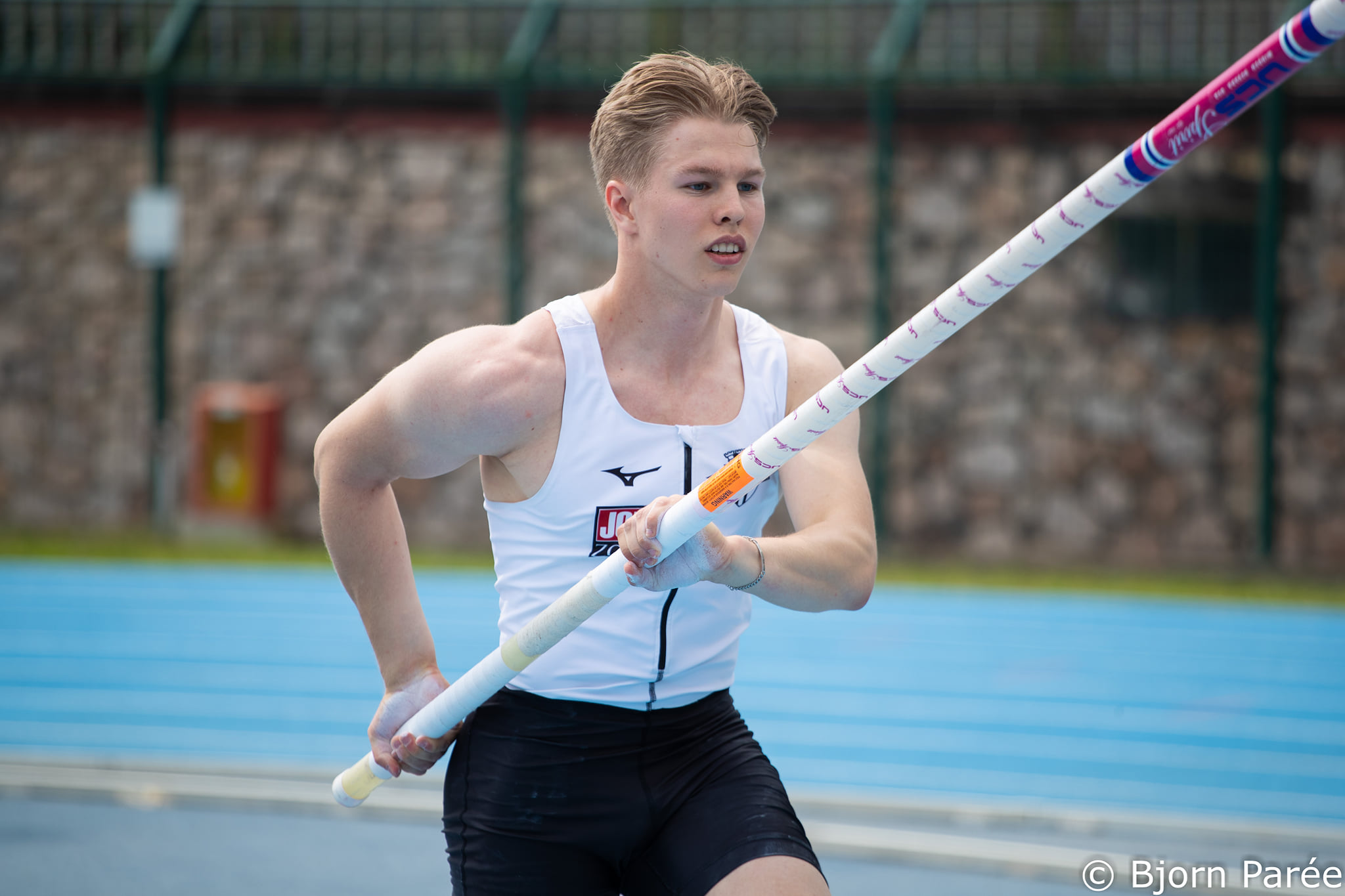MULTISTARS REVIEW 2022
At the Multistars meeting in Grosseto on the weekend of 30 April and 1 May, European U20 medallists of 2019 graduated to break their national records, Italy’s star combined eventers finally made it to 8000 and 6000 points, and fresh faces in the decathlon and heptathlon announced their arrival. And the guests of honour were the great Ukrainian combined events couple, 2009 World bronze medallist Oleksiy Kasyanov and 2013 world champion Hanna Kasyanova.
DECATHLON
100M
The Italians and the French fielded the fastest men in each heat. Italy’s Lorenzo Naidon was the fastest in heat 1 with a PB of 11.02s, while Norway’s European U20 silver medallist Sander Skotheim logged his first PB of the weekend with 11.17s, a tenth faster than his previous best. Great Britain’s Lewis Church was seeking an improvement of 200 points on his decathlon best to reach England Athletics’ standard of 7750 for the Commonwealth Games, and he started with a solid 11.51s.
Heat 2 was also won by an Italian, Simon Zandarco with 10.87s – his first time under 11 seconds – and another Norwegian also improved his lifetime best, the European U23 bronze medallist Marcus Rooth. Rooth came into the competition with a PB of 10.98s and improved it to 10.90s. Pieter Braun of the Netherlands ran 11.05s on his return to competition, Estonia’s Taavi Tšernjavski 11.11s and the New Zealand decathlon champion Aaron Booth 11.13s.
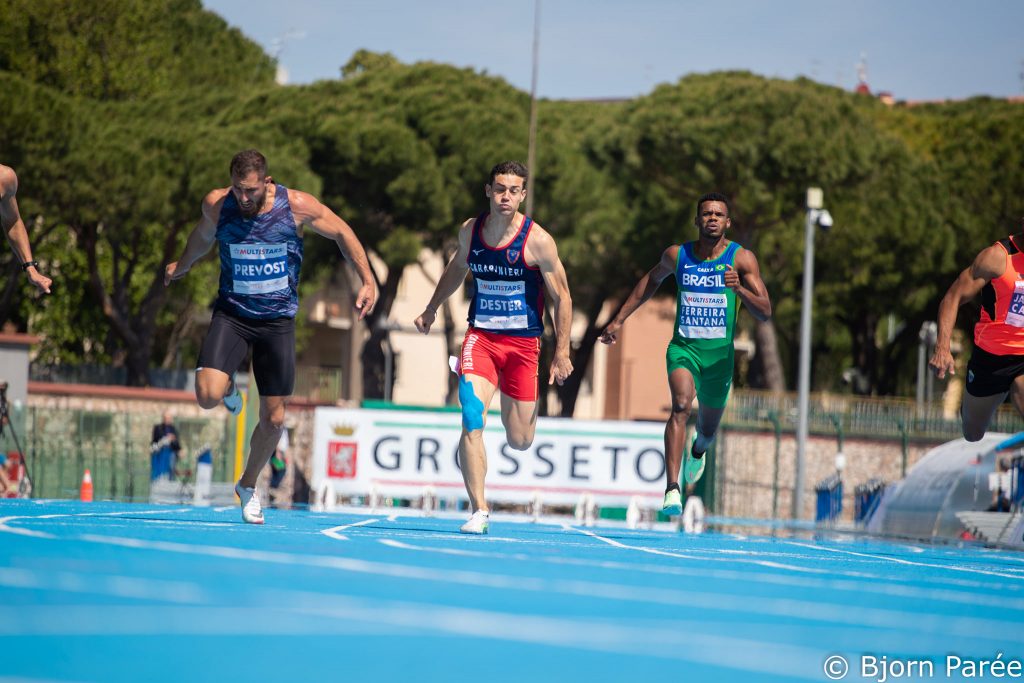
In the third heat, a superb run from France’s Arthur Prevost in 10.66s improved his PB by two tenths. However, behind him was the man who would whip the commentators into a frenzy over the next two days. Super Dario Dester ran 10.76s, like Prevost almost two tenths faster than his previous best. Kristjan Rosenberg and Risto Lillemets of Estonia ran solid races of 10.85s and 10.90s respectively. The South Americans completed the first heat: Venezuelans Georni Jaramillo (10.95s) and Gerson Izaguirre (10.96s) and Brazil’s Jose Fernando Ferreira Santana (11.07s)
After 1 event:
- Arthur Prevost 915
- Dario Dester 887
- Kristjan Rosenberg 863
- Simon Zandarco 858
- Risto Lillemets 858
LONG JUMP
While the 100m heats all enjoyed legal winds, things turned gusty in the long jump. In the first round, Sander Skotheim jumped 7.55m to equal his lifetime best. He then jumped a massive – and legal – 7.74m in the second round, and a +2.1 7.77m in the final round. Markus Rooth also hit the 7.70s for the first time in his career with a marginally windy 7.70m in the second round. Dario Dester had a good competition, equalling his outdoor PB of 7.61, and Gerson Izaguirre improved his lifetime best to 7.39m in the first round, and a windy 7.49m in the third.
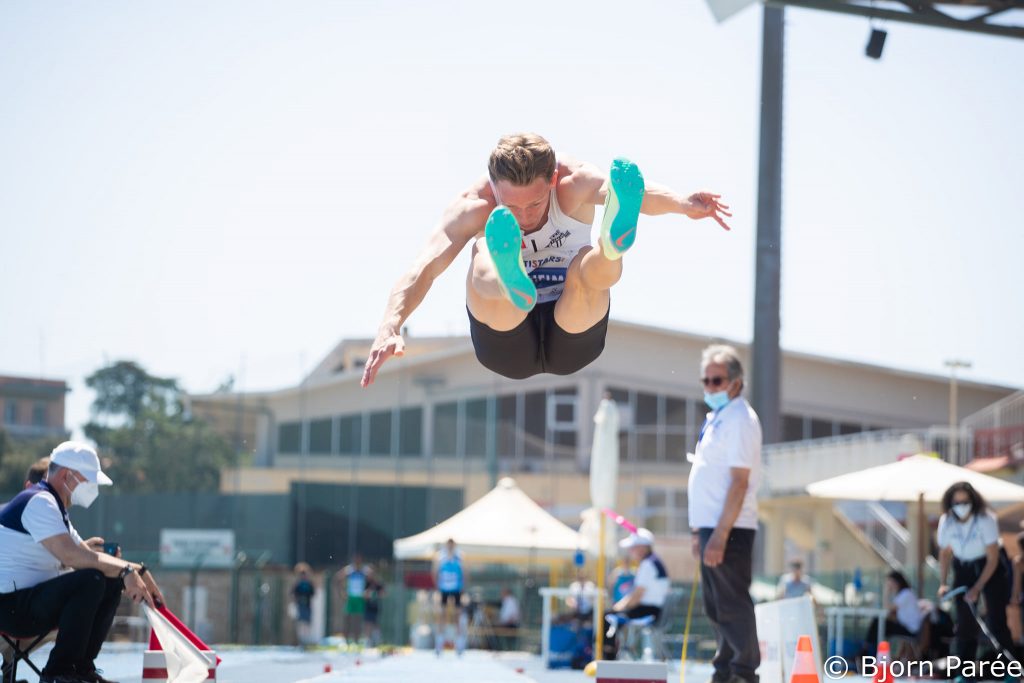
Lewis Church had a little more help from the wind with a +2.7m to take him to 7.27m (his legal PB is 7.04m) and Pieter Braun delivered a promising 7.41m in the second round.
Kristjan Rosenberg avoided repeating his three fouls from Tallinn, but his best was only 7.07m. Taavi Tšernjavski jumped 7.05m in the first round before retiring with knee pain, and Risto Lillemets jumped a routine 7.11.
The huge jumps from the Norwegians promoted them into the top three, and Dester moved into the lead.
After 2 events:
- Dario Dester 1877
- Markus Rooth 1868
- Sander Skotheim 1825
- Arthur Prevost 1809
- Gerson Izaguirre 1802
SHOT
The Stadio Olimpico Carlo Zecchini doubles as a football venue, and the heavy throws took place at the adjacent warm-up track, presumably to avoid offending the spirit of Roberto Baggio. Fans of the Night of the 10k PBs in the UK will be reminded of the beer tent tunnel on the straight. While there was no beer, there was plenty strong espresso to avoid accidental naps in the warm Italian sun.
Kristjan Rosenberg finished second at Multistars in 2019 and in the shot, it looked like he was going to start to stamp his authority on the 2022 competition. He improved his PB to 14.97m in the second round and then had his first ever throw over 15m, 15.12m, in the third. The 16m man in the field, Georni Jaramillo withdrew before the event and so the next best on paper was Pieter Braun. However, Braun’s best wasn’t just on paper, and the Dutchman launched a massive 15.67m, a PB both indoor and out.

Dester threw an outdoor best of 13.90m, Rooth a PB of 14.25m and, in his first year with the senior implements, Skotheim built on his indoor throws with outright bests of 13.71m and 13.84m.
After three events, there was yet another different leader. Rooth moved into first place, 13 points ahead of Dester who was in turn just 5 points ahead of Braun, who had moved up from sixth to third. Rosenberg and Lillemets sat in sixth and eighth but, as good high jumpers, we might expect them to make some moves in event four. Only 120 points separated first place from eighth.
After 3 events:
- Markus Rooth 2612
- Dario Dester 2599
- Pieter Braun 2594
- Sander Skotheim 2544
- Gerson Izaguirre 2541.
HIGH JUMP
When Rosenberg finished second in 2019, he and Risto Lillemets had dominated the high jump, over another Norwegian, the national record holder Martin Roe. Rosenberg had jumped 2.10m, and Lillemets 2.07m. But not this weekend.
While Lillemets, Rosenberg, Dester and Rooth’s best height was 1.95m, the measurement held different significance for each. For the Estonians, especially Rosenberg, it represented lost points. For Dester, 1.95m might have been lower than he wanted, but with three PBs in his first three events, it wasn’t a disaster. And for Rooth, it was a strong result, within single digits of his lifetime best.
Meanwhile, north of 2.00m, things were getting interesting. Lewis Church and Italy’s Lorenzo Modugno were matching each other height for height: through the 1.80m+ safety jumps, through the 1.90m+ jumps to build points, and then both topping out at 2.04m, just 1cm away from Church’s PB and 4cm from Modugno’s. The pair would go head-to-head again later in the competition.
After Church and Modugno exited the competition, the only man left was Sander Skotheim. With an indoor PB of 2.14m, he was second only to Rosenberg on paper. But with no Estonian to challenge him, Skotheim had to scale the heights on his own. He’d passed 2.04m where Church and Modugno had reached their limits and returned to clear 2.07m with ease. Another first-time clearance at 2.10m. And another at 2.13m.
Finally, 2.16m, 2cm higher than he’d ever jumped before. The bar came down first time. Again, second time. But third time, the European U20 silver medallist cleared it, and skipped for joy as he descended from the mat.
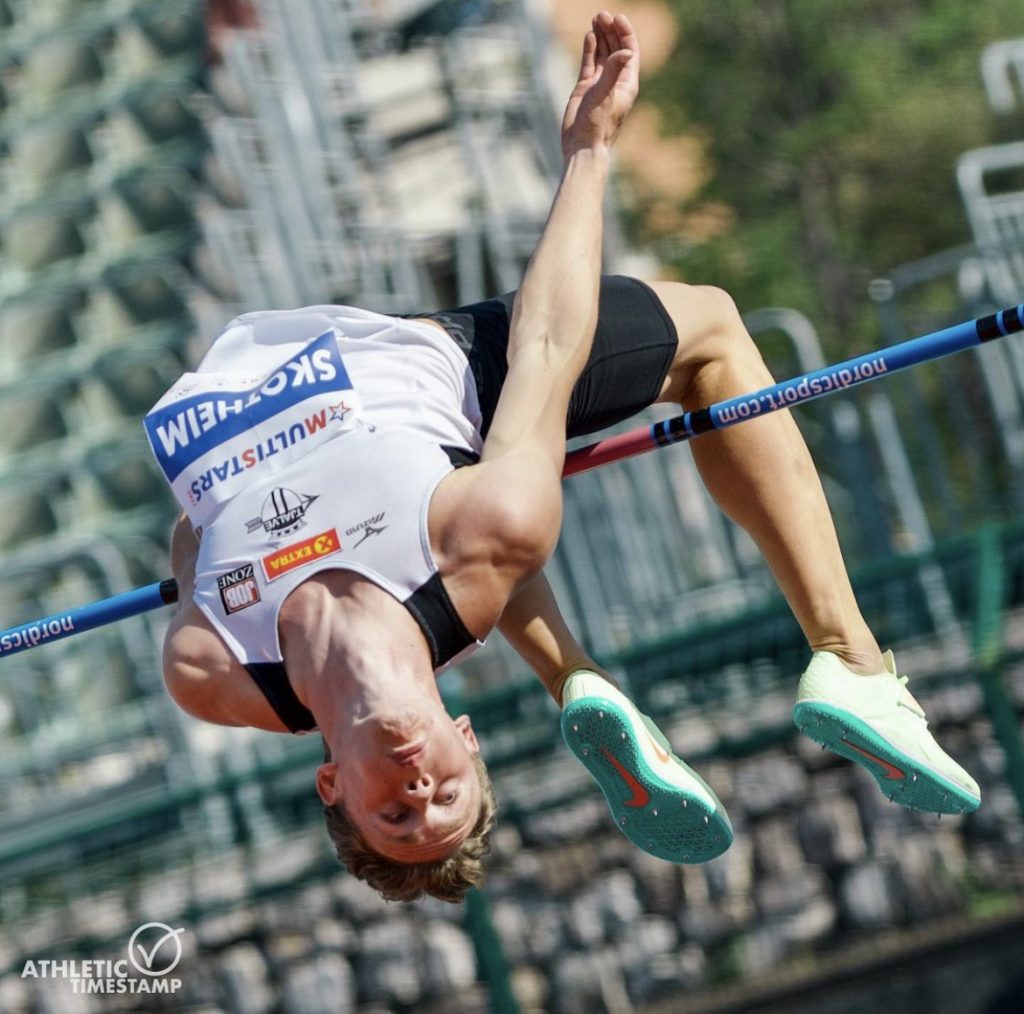
Skotheim overtook Rooth – who had still done well at one of his weaker events – for yet another change of leader. Dario Dester was third, Braun (who had cleared 1.92m) fourth, and Rosenberg edged ahead of Izaguirre (1.92m) for fifth. But the field was stretching out, and there was now 280 points between Skotheim in first and Church in eighth. Unfortunately, Aaron Booth had to withdraw from the competition after the high jump.
After 4 events:
- Sander Skotheim 3497
- Markus Rooth 3370
- Dario Dester 3357
- Pieter Braun 3325
- Kristjan Rosenberg 3279
400M
Onto the long sprint to round off the day and, like the shorter sprint in the morning, the Italians and the French would be the fastest. Simon Zandarco took a second off his PB to run 48.85s in the first seat, and behind him Lorenzo Naidon ran under 50 seconds for the first time with 49.97s. Gerson Izaguirre ran 50.56s and Lewis Church improved his PB by a third of a second in 50.68s.
In the second heat, Arthur Prevost was the fastest in any of the heats, taking a full two seconds of his lifetime best in 47.60s. Behind him Markus Rooth was just outside his lifetime best in 49.52s and Risto Lillemets 49.74s in third.
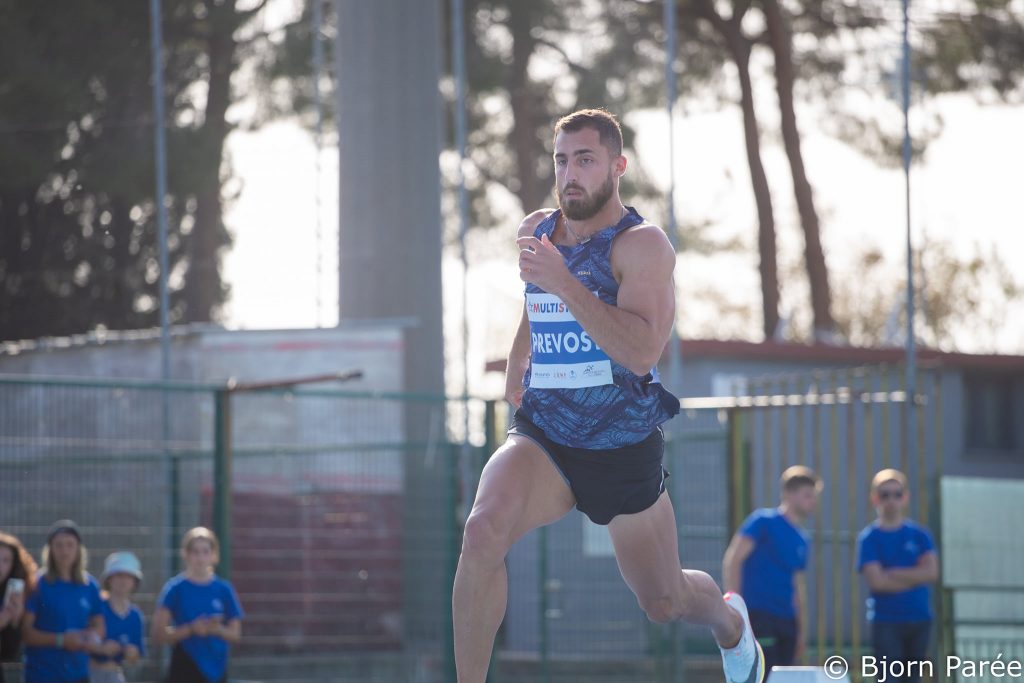
Final heat and the return of Super Dario. Dester ran 47.76s to take two tenths off his PB in a blaze of excited commentary. Braun had a decent run in 48.71s in second but Skotheim had a great run in third – the Norwegian ran 48.76s, his first clocking under 50 seconds. Spain’s Bruno Comin also had a super run in fourth place, knocking four tenths of a second off his lifetime best in 49.03s.
At the end of Day 1 Skotheim stretched his lead to 92 points ahead of Dester, who switched positions with Rooth. Prevost’s super run also moved him ahead of Rosenberg into fifth.
But a decathlon is ten events, not five.
Dester would have the edge on the Norwegians the next day in the hurdles and the 1500m. Skotheim and Rooth came into the meeting evenly matched in pole vault, javelin and 1500m. The hurdles and discus in a senior decathlon were unknown territory for Skotheim. And Braun and Rosenberg were both more than capable of making up the difference to the top three. The result was by no means certain.
After Day 1:
- Sander Skotheim 4370
- Dario Dester 4278
- Markus Rooth 4207
- Pieter Braun 4200
- Arthur Prevost 4144
110MH
By Day 2, the field had contracted sufficiently that only two heats of hurdles were required. The field reduced further when Risto Lillemets stood up from the blocks, ending his decathlon bid but remaining eligible to compete in later events.
While Risto joined Taavi Tšernjavski on the side-lines, Kristjan Rosenberg ran a lifetime best of 14.80s, finishing first ahead of Sander Skotheim (14.81s) and Lewis Church (14.87s). Arthur Prevost continued his rapid improvement, bringing his hurdles PB down from 15.72s to 14.90s.
Jose Fernando Ferreira was fastest in the second heat in 14.27s, ahead of Dario Dester’s 14.40s and a sizeable PB of 14.46s for Markus Rooth.
Pieter Braun ran 14.58s but withdrew from the competition afterwards, citing an achilles problem. More to do for the Dutch number one, but some promising signs on his return.
After six events, the top five positions remained the same, but Dester had more than halved Skotheim’s lead to just 41 points, and Rooth had reduced his gap to Skotheim from 163 points to 120 points.
After 6 events:
- Sander Skotheim 5243
- Dario Dester 5202
- Markus Rooth 5123
- Pieter Braun 5101
- Arthur Prevost 5006
DISCUS
Of those remaining in the field, Kristjan Rosenberg was the best discus thrower, and his deliberate, almost meditative approach in the circle gave him the longest throw of the competition, 46.46m. Next best was Jose Fernando Ferreira Santana with 46.03m and then Markus Rooth with 45.80m. Skotheim delivered a new senior benchmark of 43.67m, Risto Lillemets 43.62m (before withdrawing from the rest of competition) and Dario Dester a lifetime best of 41.65m.
While Skotheim retained the lead, Rooth further reduced the gap between him and his teammate to 77 points and edged past Dester into second place. With Braun dropping out of contention, Rosenberg’s strong performance enabled him to leapfrog over Prevost into fourth place.
After 7 events:
- Sander Skotheim 5983
- Markus Rooth 5906
- Dario Dester 5900
- Kristjan Rosenberg 5786
- Arthur Prevost 5620
POLE VAULT
If a bystander were to examine the personal records of the top three athletes, it would be reasonable to assume that nothing would change after the pole vault. But this is the decathlon, where the pole vault can make a mockery of the most reasonable assumptions.
Skotheim, Rooth and Dester all have similar pole vault bests: Rooth and Dester 5.00m and Skotheim 5.01m. If all three performed close to their best, there would only be marginal advantages gained from the event.
And at first, it seemed that the status quo would hold. With ominous rumbles of thunder audible in the stadium all three athletes, along with Jose Fernando Ferreira Santana, cleared 4.65m. Kristjan Rosenberg had passed at the height and re-joined the field at 4.75m.
All five athletes failed at their first attempt at 4.75m, and then again at their second attempt. For a moment, it threatened to be the most boring pole vault competition in decathlon history, as a group of athletes with near identical personal bests all underperformed by the same margin, with zero effect on their relative positions.
Dester failed on his third attempt at 4.75m. Then Skotheim. Then Rosenberg and, with his best clearance only 4.55m, his challenge was finally over. Ferreira Santana was too far behind to affect the top of the standings and so it came down to Rooth’s final attempt.
And Rooth cleared 4.75m, closing the gap to Skotheim to 47 points. He cleared 4.85m and reduced the gap to just 16 points. Then Rooth cleared 4.95m and took the lead by 14 points. Rooth’s PB was 5.00m. Did he have it in him to go to 5.05m? He did, and in the space of one event, the older of the two young Norwegians had turned a 77-point deficit into a 45-point advantage.
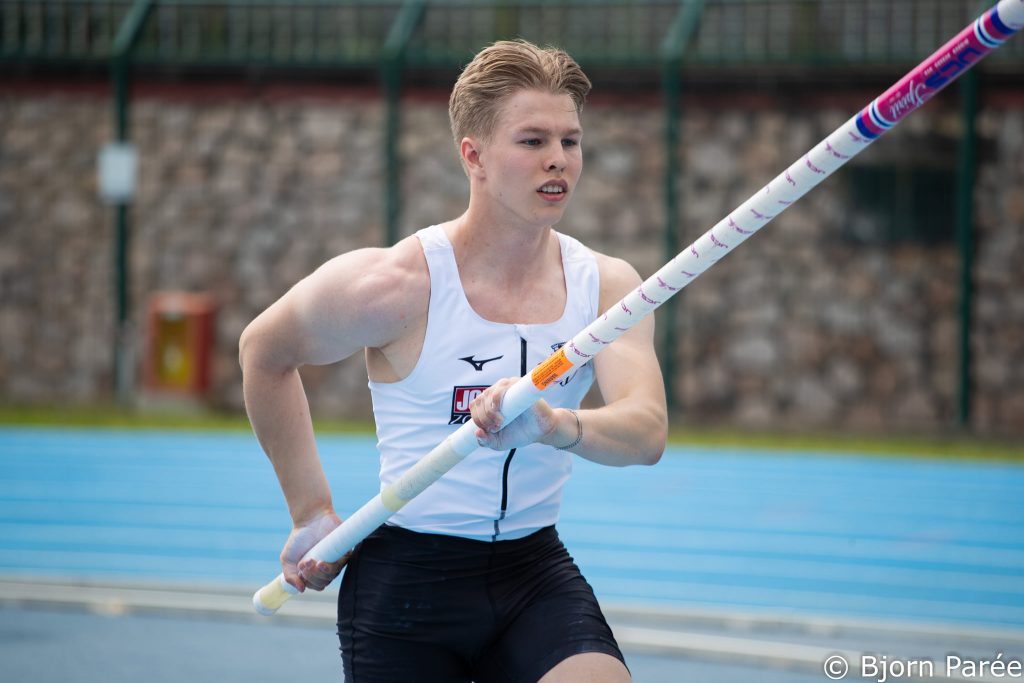
Rooth and Skotheim have similar javelin and 1500m bests, Skotheim’s the better combination by just 4 points. Similarly, while Dester was some 5-6m behind the Norwegians in the javelin, he had a 3-second faster 1500m and the potential to pull out something special at his home event. Had Rooth built up enough of a lead to win?
Meanwhile, scenes were emerging in the other pole vault bed. Lewis Church equalled his PB of 4.55m, while Lorenzos Naidon and Modugno cleared 4.65m. But the vault was another astonishing result for Arthur Prevost. The Frenchman demonstrated a dynamic run-up, the first few steps reminiscent of a knight embarking on a joust. But it was effective, and he added 20cm to his previous best and had the second highest vault of the competition behind Rooth.
After 8 events:
- Markus Rooth 6832
- Sander Skotheim 6787
- Dario Dester 6704
- Kristjan Rosenberg 6561
- Arthur Prevost 6485
JAVELIN
The mild rumbles of thunder in the pole vault escalated to full blown booms in the javelin, and Thor was waking up as the Norwegians lined up to throw their spears. The sky turned a steely grey and as Rooth and Skotheim threw over 60m, lightning bolts cracked the clouds.
Rooth threw over 60m twice, 60.26m and 60.83m, but Skotheim threw further: 61.55m, a PB by 8cm. Longest of all was Jose Fernando Ferreira Santana with 62.70m.
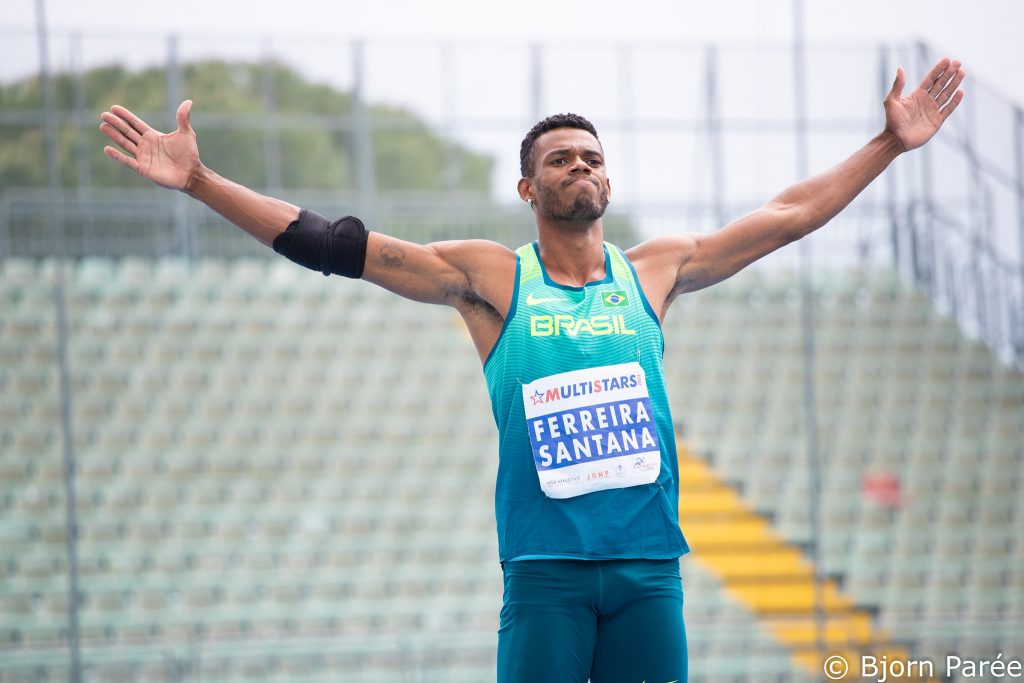
Rooth led by just 34 points. Skotheim’s 1500m best was only 8 points faster than Rooth’s. The last event was going to be close, but one thing was for sure: Martin Roe’s national record of 8228, set at Multistars in 2018, was drawing its final few breaths before heading to the underworld.
After 9 events:
- Markus Rooth 7582
- Sander Skotheim 7548
- Dario Dester 7355
- Kristjan Rosenberg 7169
- Arthur Prevost 7090
1500M
While the Norwegians were locked in battle both for victory and the national record, another goal was in site further down the field. Great Britain’s Lewis Church had fallen behind schedule in securing the England Athletics Commonwealth Games qualification of 7750, and he needed 4:23 to make the mark. His best was 4:30. It was a long, long shot.
From the gun, Lorenzo Modugno and Church set off briskly and quickly put distance between themselves and the rest of the field. Lap after lap, the towering pair maintained their pace, stretching further and further away from the other decathletes. As they came into the final straight, Church overtook Modugno and pushed for the line. The clock stopped at 4:20.44. Church had run ten seconds faster than ever before in a decathlon to score 7773 and become the first English decathlete to qualify for the 2022 Commonwealth Games. Throughout the competition, Lewis had been marking his performances out of five.
“I set my standards out one to five, if I’m in number four, I’m having a really good day,” Lewis explained. “The whole of Day 1 I got fives – I never thought I was going to jump 7.27 ever in the long jump. I just had such a good weekend. The only down bit – hurdles, I wore the new sprint spikes. I thought I’d be fine because my technique is pretty decent but you’re so wobbly when you’re actually racing. And the discus, that was hard. No-one through particularly well, and then javelin was as expected but I had such a good day before, I was maybe expecting something slightly different.”
“Then the 1500 – I knew I just had to go for it. It helped so much running behind someone who was tall – it doesn’t look as hard. When you’re behind small people, it looks like they’re moving their legs so fast, it makes me feel tired. But it was perfect – he (Lorenzo Modugno) said he was going for 4:22 and I thought – well then. Here we go. And he was true to it.”
In sixth place overall, Church was just one point behind the breakout performance of the competition, France’s Arthur Prevost, who scored 7774.
Arthur told Decathletes of Europe afterwards: “That was an amazing decathlon. Since a couple years I had to deal with a knee injury and couldn’t really express myself so I’m so happy to finally get to show what I had inside and it’s just the beginning. I had the support of my family and loved ones, my coach (Wilfried Krantz) made a lot of sacrifices to get me in shape, training me and we won’t stop until the goals are achieved. Those two days were amazing, against amazing athletes and I was grateful to be part of this. And like my mom always told me the only thing that can stop you from achieving your goals is yourself!”
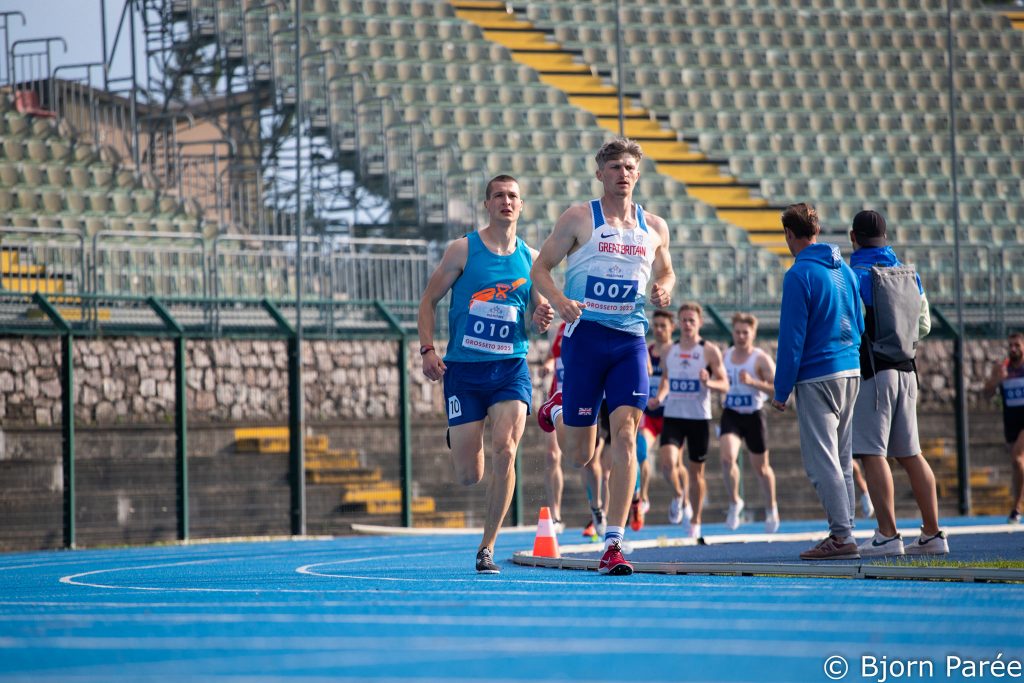
While Modugno and Church were dots on the horizon in the 1500m, Dario Dester set the pace in the chasing pack. Dester only needed 4:45 to break 8000 points for the first time, but the Italian record of 8169 was also within grasp. It needed Dario to run 4:19.71 – also a long shot with a PB of 4:32. So Dario pushed on, Skotheim staying close and taking advantage of the pace. Dester was rewarded with a lifetime best of 4:28.64s and a decathlon score of 8109. Had Dester cleared two more heights in the pole vault – as a 5m vaulter that is well within his capabilities – the national record of 8169 would have been his.
In 2019, Rooth famously improved his 1500m time by 22 seconds to win bronze at the EU20 championships in Boras. While a similar improvement seemed unlikely in Grosseto, Rooth could not afford to run at anything but his best with Skotheim only a few points behind him.
Sticking close to Dester paid off for Skotheim, and he ran 4:29.11 for a six second personal best. When he crossed the line he exceeded Roe’s mark, scoring 8298 and holding the national record for four seconds. But then Markus Rooth spreadeagled across the line, running a two second lifetime best of 4:33.08 and breaching 8300 points. A final score of 8307, the new Norwegian record, and just nine points ahead of Skotheim. The twenty-year-old and the nineteen-year-old had played cat and mouse through the ten events, pushing each other to the top end of the 2022 world lists.
“All three best Norwegian decathlons are in Multistars. Maybe it’s a lucky place for us,” Markus told Decathletes of Europe afterwards. “I’ve got one more year in the bank, and things have been super good over the winter. I skipped the indoor season to prepare for this, and I feel it worked out. It’s been a great decathlon – there’s always some ups and downs, but more ups and downs this time. I had the feeling I was going to go big, but 8300 was over my expectations.”
On playing catch up to Sander Skotheim, “I’m used to coming from behind on the last day. I’m not a big first day guy – but my first day yesterday was super good. Way over my expectations in long jump and a fast 100 – so I’m used to trying to catch up in the end and I did. I think having someone to chase always leads to the biggest performance for me. The chase is better than trying to run away from someone!”
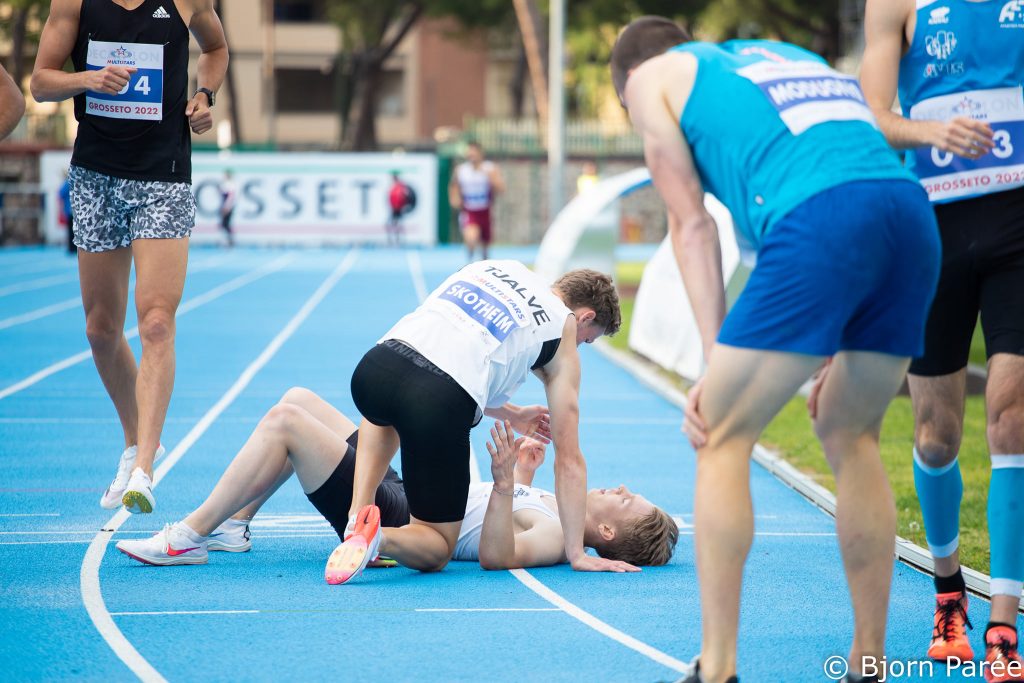
Final scores:
- Markus Rooth 8307
- Sander Skotheim 8298
- Dario Dester 8109
- Kristjan Rosenberg 7848
- Arthur Prevost 7774
- Lewis Church 7773
The full results can be found here.
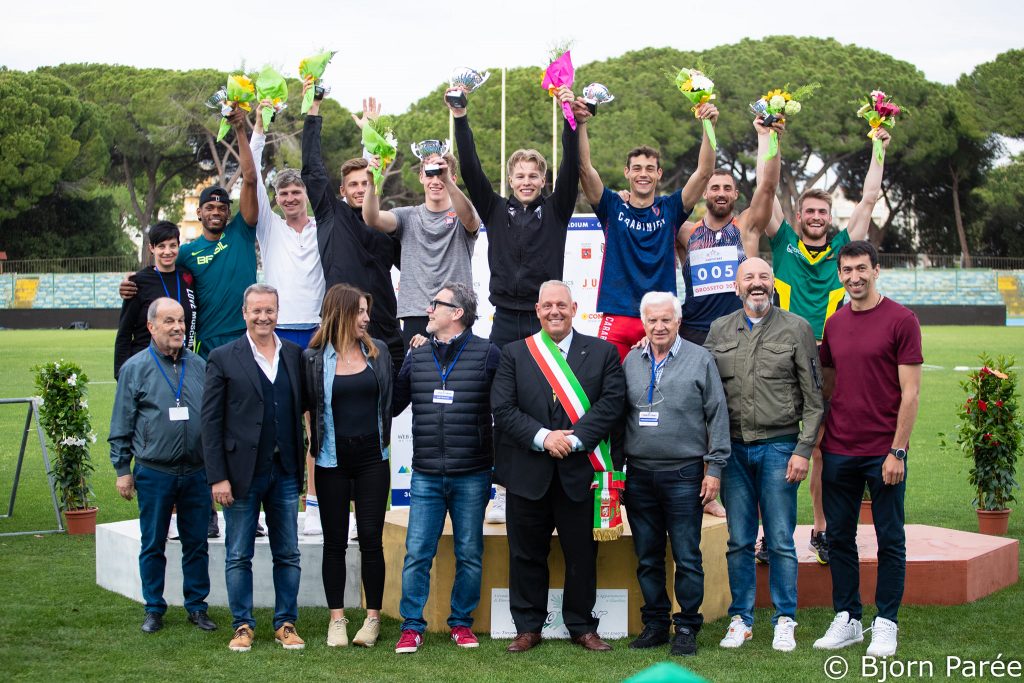
HEPTATHLON
The split sites for the competition provided variety for the athletes and spectators, but it did make it hard to track what was going on in both decathlon and heptathlon. Unlike the decathlon, the heptathlon was a much more straightforward affair, and the direction of travel and likely winner was determined from the outset. But there were similarities. Like the decathlon, the competition included a home favourite Italian breaking a significant barrier, and some promising fresh names emerging.
First, the return of Annik Kälin. The Swiss athlete led from start to finish, beginning each day with strong performances in her best events (13.43s in the hurdles and 6.55m in the long jump) and PBs in her throws. With the fast-improving Paulina Ligarska ruled out by an injury early on day two, and European U23 silver medallist Claudia Conte not yet at her best this year, Kälin ran away from the field to victory and a Swiss record. She added 228 to her PB to score 6398, and there are two points to draw from her performance.
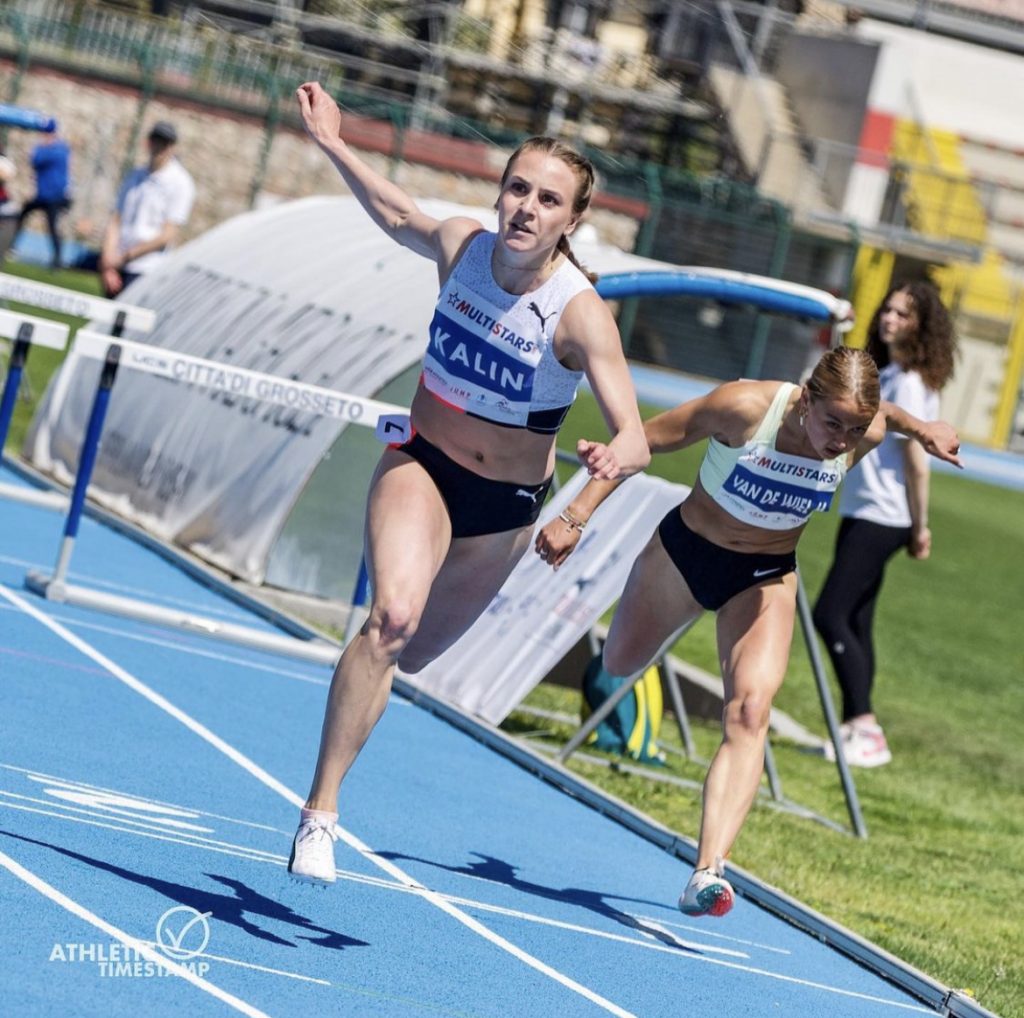
Kälin missed the bulk of 2021 due to injury and the progression she had started in the post-lockdown competitions of 2020 came to a sudden halt. So, the improvement in Grosseto should be no surprise – it’s been a long time coming. The second point is that Kälin broke the record with relatively modest performances across the board. While she set lifetime bests in the long jump, shot and javelin, they only provided her with an extra 73 points. Her record was primarily a culmination of solid performances, rather than any individual stand out performances, and so there is clearly more to come.
The woman from whom Kälin inherited the record, Géraldine Ruckstuhl, watched on from the side-lines. She had withdrawn from competition after Day 1 suffering from flu – subsequently confirmed as Covid – and things had not looked right for her all day. The high jump is the bellwether event for Ruckstuhl and, reminiscent of Arona in 2021, a weak performance in the high jump – in this case 1.62m – is a sure signal that all is not well for the Swiss.
As Annik rewrote the Swiss records, Italian home favourite Sveva Gerevini was delighting the stadium with her performance. She would not challenge Kälin, but like Dario Dester in the decathlon, there was a significant barrier to aim for and like her teammate, she broke right through it. Gerevini put together a series of 13.60-1.68-12.09-23.93-6.12-38.44-2:09.81 to break 6000 points for the first time, and score 6011.
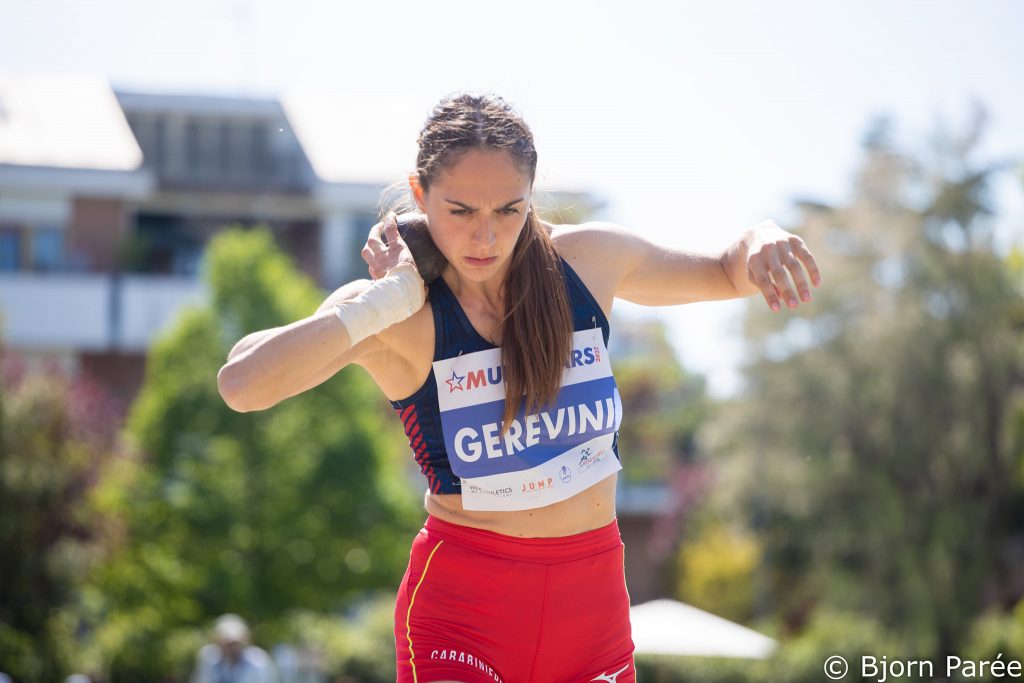
While Claudia Conte rallied to get close to 6000 points and finish third behind Kälin and Gerevini, two athletes were loading points to their lifetime bests. After a strong indoor season where she added 300 points to her pentathlon best, 20-year-old Edyta Bielska from Poland delivered PB after PB at the weekend and ran a brilliant 800m of 2:08.66 to get another 150 points closer to 6000 in the heptathlon, with 5859
And in a country overrun with world-class heptathletes, Chiara-Belinda Schuler (also 20) began seeking her place on the Austrian all-time lists alongside Verena Mayr, Ivona Dadic and Sarah Lagger. She improved all her field events in Grosseto to add almost 400 points to her heptathlon best, scoring 5816. A Götzis debut awaits the young Austrian.
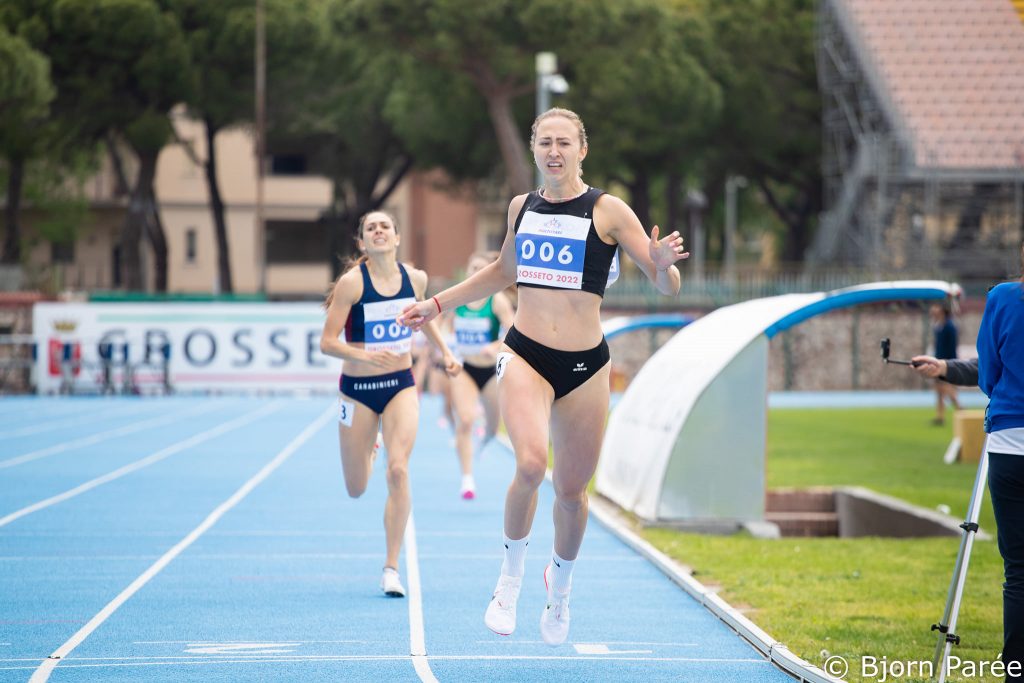
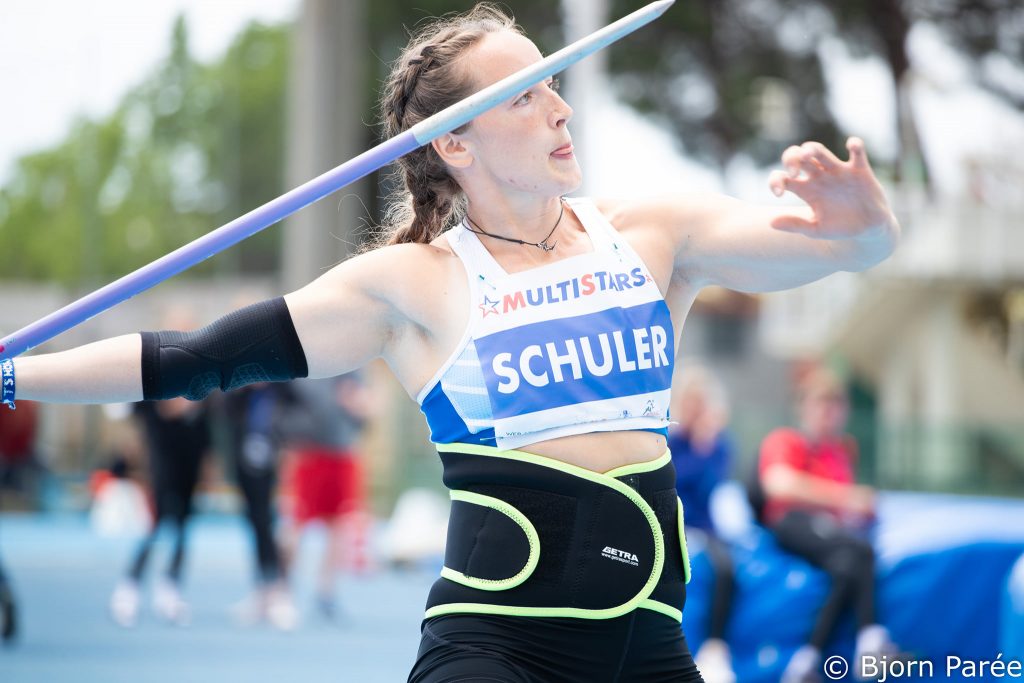
The full results can be found here.
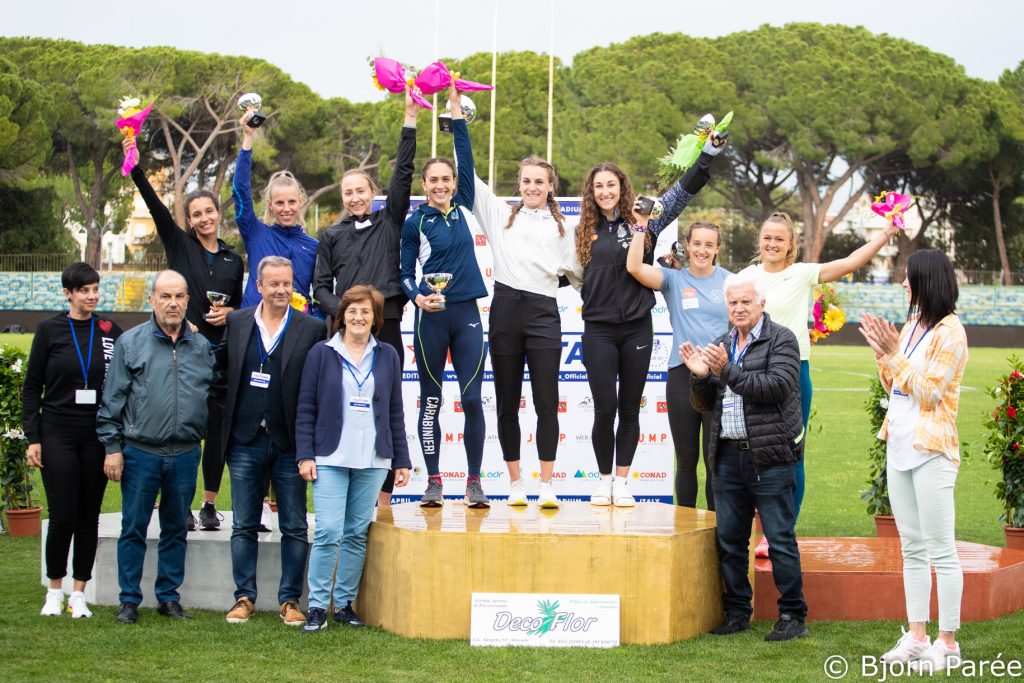
The Kasyanovs helped award the prizes to the athletes on the podium. It was a happy, but poignant, moment. A moment that reminded us the life we take for granted, whether that be to train, compete, enjoy sport or just go about our daily lives, is vastly different from that of the Kasyanovs’ teammates, their families and the brave people of Ukraine. Our thoughts are with them.

